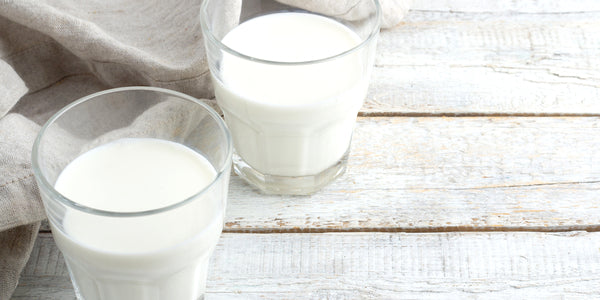
Milk consumption is started at the youngest of ages and continues to be encouraged throughout the entire lifespan. The promotion of milk relates to its rich nutrient profile, including protein, calcium, vitamin D, phosphorous, and potassium.
Yet, health experts are continuing to learn about the effects of A1 protein. Unlike the A2 protein, A1 and potential risks of heart disease and other harmful consequences.
But what exactly are these types of milk proteins and is better to drink one over the other?
Difference Between A1 and A2 Milk
According to the California Dairy Research Foundation, cows only produced A2 beta-casein more than 10,000 years ago. As cows became domesticated, A1 protein became present in Holstein cattle.
The A1 protein was passed on slowly and now dominates cattle in the Western world, including the United States. Milk from Guernsey, Jersey, Asian herds, and human milk mostly contain mostly A2 beta-casein. The A2 protein is more prominent in sheep, goat, donkeys, yaks, camel, buffalo, and sheep milk as well.
Back in 2000, a2 Milk Company™ emerged after Dr. Corran McLachlan learned proteins in milk can affect people differently. In response, a2 Milk® was created and has since then has made its way across the pond.
The specialty milk does come with a higher ticketed price, so is it really worth forking out the extra money?
A1 vs. A2 Structural Makeup
Cow’s milk is made up of water, lactose, fat, protein, vitamins, and minerals.
The proteins in milk are further divided into whey and casein. Whey comprises 20 percent of the milk protein and comprises the remaining 80 percent majority. Casein is broken down into beta-casein protein and comes in numerous variants, including the A1 and A2 beta types.
The A1 and A2 types are almost exactly identical, containing a smidge more than 200 amino acids each. But they have different amino acids at position 67, being histidine in the A1 type and proline in A2. This polymorphism, meaning occurring in several different forms, is what raises the concern of A1 milk compared to A2.
When A1 and A2 proteins are consumed, they are broken down into smaller peptides for easier digestion. The proteins are broken down into a bioactive peptide known as beta casomorphin-7 (BCM-7). However, BCM-7 levels are 4-fold higher in A1 milk according to the Journal of Applied Genetics.
BCM-7 and A1 milk may play a role in many health issues, including digestion, SIDS, autism, and schizophrenia. Populations with high levels of A2 milk appear to have lower rates of heart disease and type 1 diabetes as well.
Is A1 or A2 Milk Better?
The mission of a2 Milk Company™ is "to pioneer the scientific understanding of the A2 protein type so more people can enjoy the nutritional goodness that only comes from real cows' milk."
Like A2 milk in the Western world, the research regarding the advantage of the milk protein is still emerging. Albeit, some research suggests switching to A2 milk could be beneficial in regards to digestion and reducing certain health diseases.
Digestion
Consumers are often intrigued to switch to A2 milk due to the claim of being digested more easily compared to A1. And "a2 Milk® is easier on digestion and may help some avoid discomfort," states the a2 Milk Company™ website.
People with lactose intolerance have little to no lactase, the enzyme that breaks down lactose. The lacking enzyme can cause diarrhea, constipation, bloating, gas, and bloating. While A1 and A2 milk both contain lactose, some people find A2 milk easier to digest.
A systematic review compared the digestive impact of A1 and A2 in available research, which included animal and human studies. In humans, there is limited evidence that A1 delays bowel transit time and leads to looser stools. Digestive discomfort is also correlated with inflammatory markers in humans for A1 but not A2.
All-in-all, though, more human research is needed to better understand the digestive effects of A1 and A2.
Ischemic Heart Disease
Ischemic heart disease, or coronary heart disease, is caused by narrowed heart (coronary) arteries that supply blood to the heart muscle.
The narrowing can be caused by a blood clot or by constriction of the blood vessel. Most often it is caused by a buildup of plaque, also known as atherosclerosis. When blood flow to the heart is completely blocked, the heart muscle cells die. This is known as a heart attack.
Evidence from The New Zealand Medical Journal found a higher incidence of ischemic heart disease when A1 was more prevalent.
Type 1 Diabetes
Type 1 diabetes an autoimmune disease in which the body’s own immune system destroys the cells that produce insulin. Without insulin, blood sugars rise and can be fatal without proper insulin therapy.
The exact cause of type 1 diabetes remains unknown, though environmental and genetic factors are thought to come into play.
Research in Nutrition & Diabetes suggests a1 milk protein may trigger type 1 diabetes in people with genetic risk factors.
Schizophrenia
Schizophrenia is a severe, chronic brain disorder in which people may experience delusions, confusion, personality loss, and bizarre behavior.
The condition is complex without a known cause. But physical, genetic, psychological, social, and environmental factors can lead to the development of schizophrenia.
A1 beta-casein and BCM-7 have also been linked to schizophrenia.
Autism
Autism is a mental condition characterized by poor social skills and repetitive behaviors. Those with autism often face speech and nonverbal communication challenges, too.
Aggravation of some autism symptoms has been suggested to be linked to some of the constituents of milk. Or, in particular, BCM-7 found in the majority of mammalian dairy products.
Sudden Infant Death Syndrome
Sudden infant death syndrome (SIDS) is the unexplained death of a seemingly healthy baby under the age of one. SIDS is often known as crib death, as the infants often die in their cribs during sleep.
The cause of SIDS is still unclear. However, SIDS might be linked to defects in the portion of the brain that controls breathing and arousal from sleep.
Researchers have since discovered some factors that might put babies at extra risk, including a1 milk protein.
A1 vs. A2 Milk: The Bottom Line
As research continues, the debate about the potential benefits and risks of A1 and A2 milk remains underway. But since all dairy milk is chockful of nutrients, concluding A2 milk is superior is premature at this time.
To the consumers willing to pay, or not pay, extra for milk, both are nutritious choices. Health experts also suggest A2 milk could be helpful for those who struggle with digestive issues.







